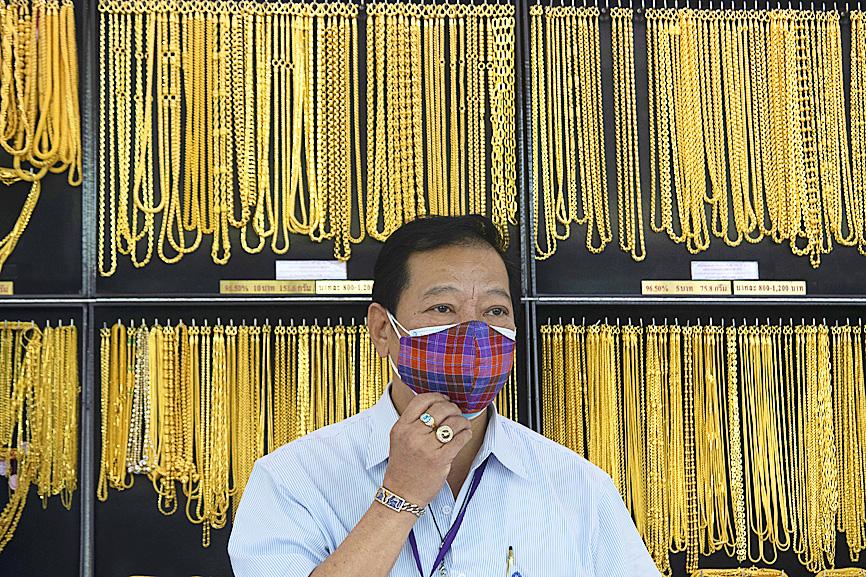Gold prices yesterday climbed to an all-time high and the US dollar extended its slump as investors mulled simmering Sino-American tensions, the upcoming US Federal Reserve meeting and a smattering of second-wave outbreaks of COVID-19.
Gold strengthened 2.1 percent to US$1,941.09 an ounce. The precious metal notched its biggest intraday increase since April, while a gauge of the US dollar sank to levels seen in January last year. Treasuries edged higher, and bitcoin climbed back above US$10,000.
Precious metals, along with bonds, are often seen as stores of value when financial markets decline. Investor concern about the global economy and expectations that the US central bank’s rate-setting Federal Open Market Committee (FOMC) could reinforce a dovish outlook are driving the US dollar and precious metals in opposite directions, while supporting US equities.

Photo: AP
Meanwhile, fresh outbreaks of the virus emerged from China to Spain, although cases fell in California, Arizona, Florida and New York.
“The July FOMC meeting should kick off a period from August into mid-September in which markets should price in an increasingly dovish, forward-looking Fed policy via lower real rates,” Morgan Stanley strategists including managing director Matthew Hornbach wrote in a report. “This should benefit breakeven inflation rates, support risk assets, and weigh on the US dollar.”
Analysts say that the mixed indicators in the past few months would not be enough to get the FOMC to change course, particularly not after it cut the benchmark lending rate to 0 to 0.25 percent in March.
“We don’t expect much to come out of this particular meeting,” Barclays PLC deputy US economist Jonathan Millar said.
Additional reporting by AFP

ADVANCED: Previously, Taiwanese chip companies were restricted from building overseas fabs with technology less than two generations behind domestic factories Taiwan Semiconductor Manufacturing Co (TSMC, 台積電), a major chip supplier to Nvidia Corp, would no longer be restricted from investing in next-generation 2-nanometer chip production in the US, the Ministry of Economic Affairs said yesterday. However, the ministry added that the world’s biggest contract chipmaker would not be making any reckless decisions, given the weight of its up to US$30 billion investment. To safeguard Taiwan’s chip technology advantages, the government has barred local chipmakers from making chips using more advanced technologies at their overseas factories, in China particularly. Chipmakers were previously only allowed to produce chips using less advanced technologies, specifically

BRAVE NEW WORLD: Nvidia believes that AI would fuel a new industrial revolution and would ‘do whatever we can’ to guide US AI policy, CEO Jensen Huang said Nvidia Corp cofounder and chief executive officer Jensen Huang (黃仁勳) on Tuesday said he is ready to meet US president-elect Donald Trump and offer his help to the incoming administration. “I’d be delighted to go see him and congratulate him, and do whatever we can to make this administration succeed,” Huang said in an interview with Bloomberg Television, adding that he has not been invited to visit Trump’s home base at Mar-a-Lago in Florida yet. As head of the world’s most valuable chipmaker, Huang has an opportunity to help steer the administration’s artificial intelligence (AI) policy at a moment of rapid change.

TARIFF SURGE: The strong performance could be attributed to the growing artificial intelligence device market and mass orders ahead of potential US tariffs, analysts said The combined revenue of companies listed on the Taiwan Stock Exchange and the Taipei Exchange for the whole of last year totaled NT$44.66 trillion (US$1.35 trillion), up 12.8 percent year-on-year and hit a record high, data compiled by investment consulting firm CMoney showed on Saturday. The result came after listed firms reported a 23.92 percent annual increase in combined revenue for last month at NT$4.1 trillion, the second-highest for the month of December on record, and posted a 15.63 percent rise in combined revenue for the December quarter at NT$12.25 billion, the highest quarterly figure ever, the data showed. Analysts attributed the

Taiwan Semiconductor Manufacturing Co’s (TSMC, 台積電) quarterly sales topped estimates, reinforcing investor hopes that the torrid pace of artificial intelligence (AI) hardware spending would extend into this year. The go-to chipmaker for Nvidia Corp and Apple Inc reported a 39 percent rise in December-quarter revenue to NT$868.5 billion (US$26.35 billion), based on calculations from monthly disclosures. That compared with an average estimate of NT$854.7 billion. The strong showing from Taiwan’s largest company bolsters expectations that big tech companies from Alphabet Inc to Microsoft Corp would continue to build and upgrade datacenters at a rapid clip to propel AI development. Growth accelerated for